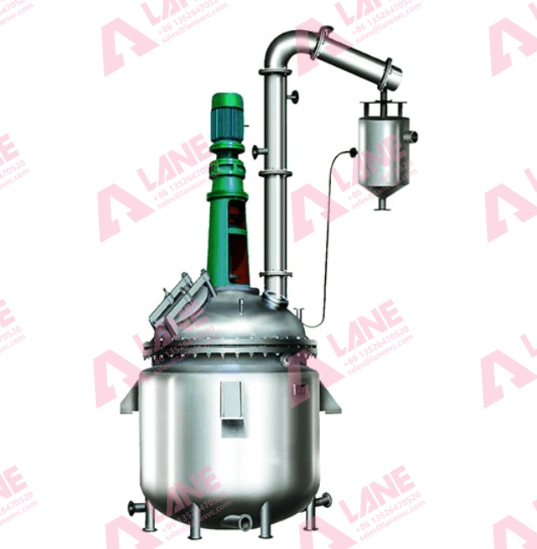Release time:2025-10-15 popularity:407
In chemical manufacturing, choosing the right Reactor Equipment is one of the most crucial decisions that determines production efficiency, safety, and product quality. Reactors are the heart of chemical plants—they facilitate essential reactions that transform raw materials into valuable products. Selecting the appropriate reactor ensures stable performance, optimal reaction conditions, and long-term operational reliability.
With multiple reactor types available, including glass lined reactors, stainless steel reactors, carbon steel reactors, and liquid reactors, understanding their differences is vital for investors and engineers aiming to design or upgrade a chemical manufacturing plant.
Reactor Equipment refers to a vessel or system designed to carry out controlled chemical reactions. These systems maintain specific temperature, pressure, and mixing conditions to ensure the desired chemical transformation. A well-designed reactor enhances product yield, minimizes side reactions, and reduces maintenance downtime. Key factors that define reactor performance include:
Chemical Compatibility: The first consideration in selecting Reactor Equipment is chemical compatibility. For highly corrosive acids or alkalis, a Glass Lined Reactor provides superior resistance. Its enamel coating protects against chemical attack and contamination, making it ideal for pharmaceuticals, dyes, and fine chemicals.
Material Strength and Durability: When reactions involve high pressure or temperature, Stainless Steel Reactors are preferred for their mechanical strength, heat resistance, and long lifespan. They can handle both exothermic and endothermic reactions efficiently while maintaining purity. For cost-sensitive operations where corrosion is moderate, Carbon Steel Reactors offer a practical balance between affordability and strength. They are widely used in bulk chemical and petrochemical production.
Reaction Type and Phase: For processes that involve fluid or semi-fluid materials, Liquid Reactors ensure proper mixing, temperature uniformity, and reaction control. Their flexible design allows integration with agitators, condensers, and heat exchangers for precise process regulation.
Operational Safety and Automation: Modern Reactor Equipment should integrate temperature and pressure sensors, automated control panels, and safety valves. These systems prevent overpressure incidents and maintain process stability, especially in large-scale continuous operations.
Energy Efficiency and Maintenance: Selecting an energy-efficient reactor design reduces overall operating costs. For instance, glass lined and stainless steel reactors with optimized heat transfer surfaces minimize energy consumption. Additionally, easy-to-clean designs lower maintenance time and improve plant uptime.
Different types of Reactor Equipment are designed to meet specific process needs and chemical characteristics.
Glass Lined Reactors are best suited for handling highly corrosive materials and strong acids. They offer excellent chemical resistance and a smooth, non-stick inner surface, making them ideal for producing pharmaceuticals, agrochemicals, and other sensitive products.
Stainless Steel Reactors perform exceptionally well in high-pressure and high-temperature reactions. Their durability, heat resistance, and long service life make them a top choice for food processing, petrochemical, and fine chemical industries.

Carbon Steel Reactors are widely used for general chemical reactions. They provide a cost-effective balance of strength and affordability, suitable for fertilizer production, bulk chemicals, and intermediate processing lines.

Liquid Reactors, on the other hand, are specifically designed for liquid-phase reactions. With excellent mixing and temperature control, they are commonly applied in the production of resins, adhesives, coatings, and other fluid-based materials.

Many new investors make the mistake of selecting reactor systems based solely on price or appearance. However, overlooking critical design aspects—such as liner thickness, agitation speed, or cooling capacity—can lead to reduced yield and costly repairs. Always verify material certifications, pressure ratings, and manufacturer testing standards before purchase.

Investing in high-quality Reactor Equipment delivers long-term operational benefits:
In industries where production stability and purity are non-negotiable, premium reactors provide both performance and peace of mind.
A chemical manufacturing company in Southeast Asia upgraded its outdated carbon steel units to stainless steel reactors with automated control systems. The result was a 15% improvement in yield and a 12% reduction in energy consumption. Similarly, glass lined reactors in its acid-handling section reduced corrosion-related maintenance by 40%.
This example shows how the right Reactor Equipment not only boosts performance but also ensures safer and more sustainable operations.
Choosing the right Reactor Equipment is not just a technical decision—it’s a strategic investment in efficiency, quality, and sustainability. By carefully evaluating materials, design, and process requirements, chemical manufacturers can achieve consistent output and long-term cost savings.
For professional guidance and reliable reactor solutions, Henan LANE Heavy Industry Machinery Technology Co., Ltd. provides customized glass lined, stainless steel, carbon steel, and liquid reactors built to global standards.
For more details, please feel free to contact us.
Henan Lane Heavy Industry Machinery Technology Co., Ltd.
Email: sales@lanesvc.com
Contact number: +86 13526470520
Whatsapp: +86 13526470520